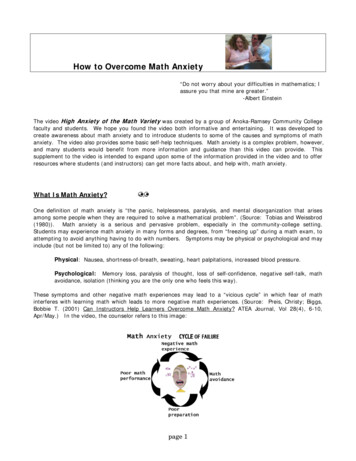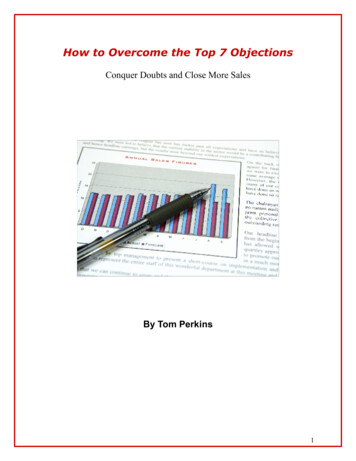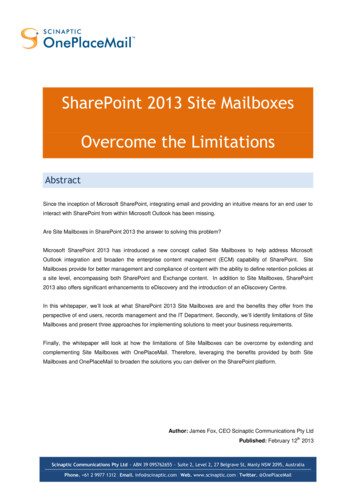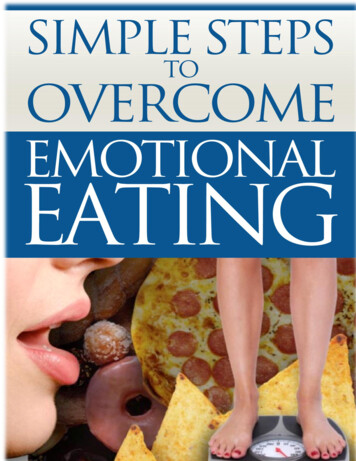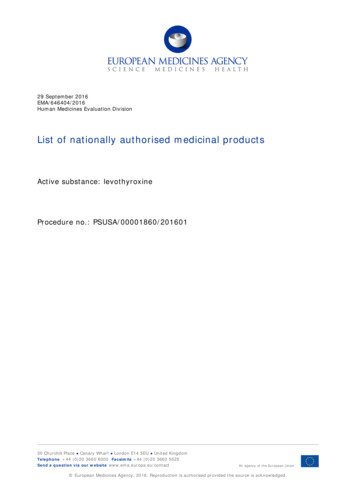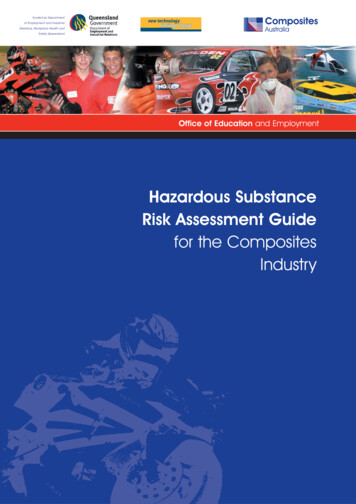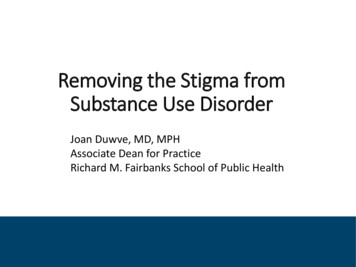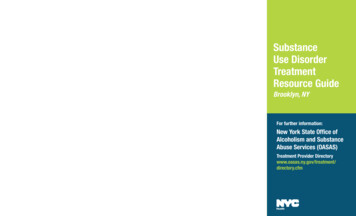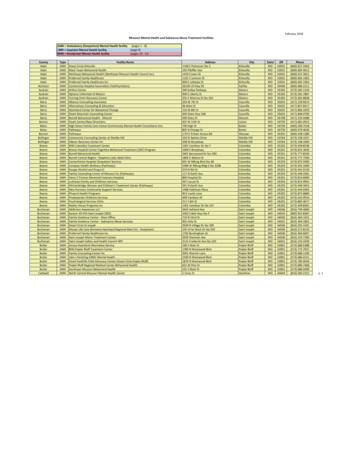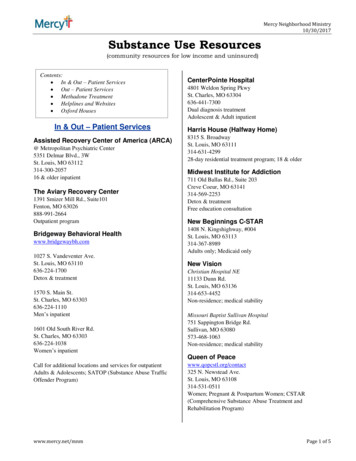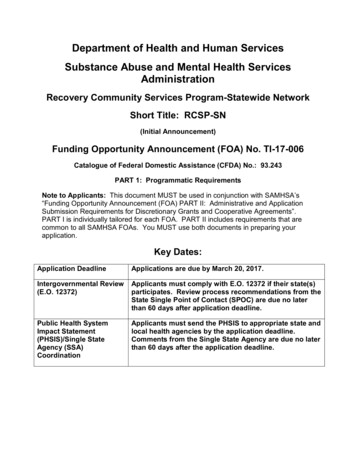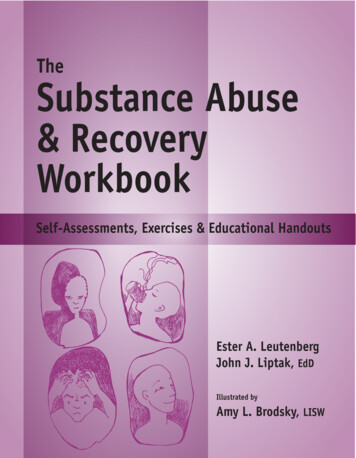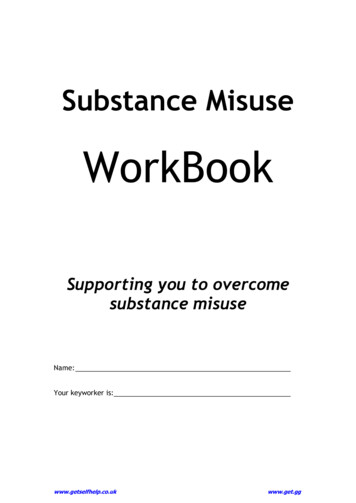
Transcription
Substance MisuseWorkBookSupporting you to overcomesubstance misuseName:Your keyworker is:www.getselfhelp.co.ukwww.get.gg
SectionPageHow do I use this WorkBook?1What‟s the problem?2Keeping a record3Substance Diary4-6What do I get out of it?7-8Am I ready for change?9-10How to reduce your substance use11How do I stop?12How do I stay stopped?13-14Avoidance of risks & triggers15-16The crossroads17-18Coping with cravings19Breaking the associations20Emotional roller-coaster21-22Managing anxiety23-26Problem -38Unmet needs do you have any?39-42Life Goals43www.getselfhelp.co.ukwww.get.gg
How do I use this workbook?This booklet has been written to help and support people whoattend CDAT.We have tried to cover the main areas that people may needadvice/help with. However you will have a named keyworker andyou may speak to them whenever you need to.The booklet contains information and general advice as well asexercises intended to get you thinking. Some parts of thebooklet are designed to be taken away and completed on yourown, others parts, you may wish to do together with yourkeyworker.It has been divided into separate sections and designed so thatyou can dip in and out of the parts depending on what it relevantto you at the time.Many people use alcohol and other substances to celebrate,relax or to feel better when they are bored, lonely or unhappy.Other people believe that substance use relieves the symptomsof mental health problems. Alcohol and other substanceshowever, generally don’t make people feel better in the longrun and the results can be very harmful when substance use getsout of control.1www.getselfhelp.co.ukwww.get.gg
What‟s the problem?Do you want ocut down butcan't?Do you feel sickwhen cuttingdown orstopping?Do you feelbetter whenusing?Have you everhad to have an'eye opener'?Do you havecravings to use?Are youconcernedabout yoursubstanceuse?Do you feelguilty about yoursubstance use?Are other peopleworried?Do you feelangry whenothers criticiseyour substanceuse?Do you feel thatthe substance isthe mostimportant thingin your liife?Can you say yes to any of the above?If so, you may need to think about reducing or stopping.2www.getselfhelp.co.ukwww.get.gg
Keeping a recordPeople may be drinking alcohol or taking other substances but donot really know exactly how much they are using and when. It isimportant to keep a record of how much you are drinking or„using‟ so that you can see which substances are a problem,when you use them, how much you are actually spending andhow you are feeling when you use them.Over the page you will find a „Substance Diary‟. You can agreewith your keyworker about how long you should complete thediary – this may be for a few days or a few weeks. Here, youhave enough to complete 7 days worth but you can get moreblank copies of the diary from your keyworker if you need it.See if it reveals anything you didn‟t know!3www.getselfhelp.co.ukwww.get.gg
Substance DiaryDay:Substance takenAmountWhat were you doing? Where?Who were you with? How didyou feel?Substance takenAmountWhat were you doing? Where?Who were you with? How didyou feel?Substance takenAmountWhat were you doing? Where?Who were you with? How didyou w.get.gg
Day:Substance takenAmountWhat were you doing? Where?Who were you with? How didyou feel?Substance takenAmountWhat were you doing? Where?Who were you with? How didyou feel?Substance takenAmountWhat were you doing? Where?Who were you with? How didyou w.get.gg
Day:What were you doing? Where?Who were you with? How didyou feel?Substance takenAmountMorningAfternoonNightLooking back over your diary you may see some interesting thingsabout your substance use. For example, do you always use aloneor with the same people? Do you usually start drinking or usingother substances at the same time each day? Is there a usualfeeling (sadness, boredom, anxiety) that prompts you todrink/use substances?What about what was around you at the time? Are the situationssimilar or different for you each time?What were you thinking? Did you have a craving or an urge to useor were you just bored?What substance did you use most frequently? How much did youspend?Now record your observations from the diary, you may wish tosit down and do this with your keyworker.6www.getselfhelp.co.ukwww.get.gg
What do I get out of it?What do I expect substances will do for me?Many of the thoughts people have about drinking alcohol andtaking other substances are related to what people expect tohappen to them while they drink or „use‟. These types ofthoughts are called expectancies and are closely linked to whypeople use.Some of the reasons people give for drinking or using other drugsinclude:Drinking makes me feeloutgoing and friendlyI drink becauseit‟s a habitIt helpsme relaxSmoking cannabismakes me morecreativeI get better ideaswhen I am drinkingIt helpsme sleepI couldn‟t leave the housewithout having a drinkwww.getselfhelp.co.ukIt gives memoreconfidence7www.get.gg
It is very common, that our ideas about what a substance will dofor us is not what really happens when we use. For example, aperson who thinks drinking makes them more sociable in factoften feels more afraid of people and withdraws from them whenthey drink.What are your expectations? Weighing up the pros and cons What do you gain? What do you lose? What are the good things?What are the not so good things?Good things aboutdrinking/using?Less good things gg
Am I ready for change?A useful way of describing where people are in their readiness to changeappears below. Which description best fits you at the moment?HAPPY USERIN TWO MINDSGET READY,GET SETGO!KEEPING IT UPTO LAPSE ORNOT TO LAPSE?Happy userThe person sees no problem and wants to continue without making anychanges.In two mindsThe person is thinking about change. They have acknowledged that thereare one or more things about continuing that are a problem or are no longergood BUT the person still enjoys it.Get ready, get setThe person has made a decision to change, is preparing to change but hasnot done so yet.Go!The person has put the idea of change into practice and may have veryrecently given up or cut down.Keeping it upThe person has kept up their change over time and is in the process ofreaching their goals.To lapse or not to lapse?They have resumed using substances either a little or a lot. They arereconsidering their options.9www.getselfhelp.co.ukwww.get.gg
Do I want to change my substance use?Now that you have become more familiar with how you drink oruse other substances and what they do or not do for you, it istime to really think about whether you want to make anychanges.After completing your own „scales‟ and thinking about how readyto change you are, how do things look to you?Looking at the items on the not so good list, really think aboutwhether these are things that really concern you. Are they reallyyour own concerns, or those of someone else?Making a decisionNow you have weighed up the „good things‟ against the „not sogood things‟ and have considered your own personal concernsabout continuing to drink or take other substances, it is time toset yourself a goal.Your goal may be to reduce the harms or problems that the use iscausing, it may be to cut down or quit altogether. If you areusing more than one substance you may have different goals foreach. List your goals below:SubstanceGoalNow that you have set your goals, now is the time to think aboutmaking a plan to help you achieve them.10www.getselfhelp.co.ukwww.get.gg
How to reduce your substance use1.Set limits – decide beforehand how much you aregoing to drink or „use‟ and then stick to it. Try tomake the limits reasonable and realistic.2.Take it slowly – pace yourself, avoid rushing as thisleads to it running out of control.3.Start later in the day – if you normally start at certaintime set that a little later but avoid extending yourdrinking or using time.4.Eat – drinking on an empty stomach for example canlead to rapid intoxication – feeling full may lead to areduced desire to use or drink.5.Shift to less harmful substances – low strength alcoholfor example.6.Keep occupied – boredom can be your worst enemy.7.Avoid heavy users – keeping away from people whomay lead you into situations you don‟t want to be in.8.Limit your spending power – it may be useful to limitwhat you spend. Only have a certain amount ofmoney on you at any one time. It is important toresist temptation to borrow money or get it by othermeans.9.Have a „dry‟ or „clean‟ period – it is worth consideringhave some time completely off.10.Give yourself material rewards for any success, forexample for having a dry day get yourself somechocolate, new clothes or a magazine. Something youare going to enjoy that does not involve substances.11www.getselfhelp.co.ukwww.get.gg
How do I stop?If you have decided to stop drinking or „using‟ altogether you willneed to work out a plan on how to do this with your keyworker.This may involve a detoxification if you are diagnosed to bephysically dependent. We have various leaflets and informationthat will help you through this process. These can be obtainedthrough your keyworker.The Blame GameAlcohol or other substance misuse problems are often related tohaving certain problems in life. Your alcohol/other substancetaking behaviour may have increased following problems in yourfamily, the breakdown of a relationship or losing your job. Insome cases it may be a way of blocking out unpleasant ordisturbing memories, maybe from your childhood.When you have experienced such events, it‟s natural to want toblame others for your problems. It‟s very tempting to say “I‟mdrinking heavily because my wife left me ”.The fact is, though, that it is your problem – not theirs. You arethe only person who can put things right. One of the main keysto overcoming a drink/drug problem is to accept that you areresponsible for your recovery.Your family and friends can give you tremendous support butthey can‟t do it for you. Your keyworker can also help but it‟syou that‟s going to have to cope when times get tough. You haveto accept that you are the main person who can make thenecessary changes in your life. Do this and you will have morethan a fighting chance of overcoming your addiction.12www.getselfhelp.co.ukwww.get.gg
How do I stay stopped?It is important that you work out a plan to help you on your wayto remaining stopped. This will involve looking at riskysituations, stressors and triggers and making some changes toyour lifestyle.Some triggers may include:Feelings - boredom,loneliness, sadness,anger, blameOther people using friendsCertain days (payday) or times of theday (tea-time)Arguments andother stressorsPartiesOnce you know what are risks and triggers are you can make aplan and BE PREPARED.13www.getselfhelp.co.ukwww.get.gg
You now need to take some time to think about your riskysituations and triggers that may lead you to have a slip.Complete the table below – you may wish to do this with yourkeyworker or on your own. It asks you to look at what thetriggers are, how you‟ve dealt with them and how you may dealwith them differently.Trigger/StressorExample:argument withyour partnerHow do you feelemotionally/physicallywhen this happens?Angry and upsetHeart races and cannotsit downWhat do you dowhen thishappens?Have to get outof house so slamdoor and go tothe pubWhat could you do differently?Go to another room and calm down.Think why partner is upset. Talk topartner when calmed down and try tosort the argument out14www.getselfhelp.co.ukwww.get.gg
Avoidance of risk and triggersA good initial plan for people who are starting off with changingthings is to avoid the risky situations and triggers. This may seemobvious but for example some people go to the pub after only afew days of not drinking and think that will-power alone will stopthem from having a drink.It is important to remember that will-power alone does not equalskill-power and a person who places themselves at risk withoutthe skills and tools to cope with the situation will frequently slipor relapse.In the early stages of change, avoidance of obvious risks isimportant. For example avoid places where you drank or usedto, the people who supplied you or you drank with (if you can)etc.Avoidance is recommended while you develop the skills tomanage these situations in the future. Avoidance is notrecommended as a long-term plan through, as it is impossible foryou to avoid triggers and risk all the time. An important point toremember is, avoidance of a situation is possible but avoidanceof feelings is not.We often think that we are not very good at coping with difficultsituations but EVERYBODY has a „tool box‟ full of coping skillsjust sometimes they are forgotten.Next is an exercise designed to get you thinking about preventingrelapse in general terms and what skills you need to have to dealwithdifferent situations.15www.getselfhelp.co.ukwww.get.gg
What can I do toreduce the risks ofrelapse?Example: I can deletemy drug dealers numberfrom my phoneExample: My matesalways tease me if I donot go for a few pintswith them – explain tothem that I cannotdrink anymore and tryto make new friendsthat do not drinkDo I have to skills tocarry this out?How do I get these skills?Yes-I have never beenassertive and alwayswant to please peopleso I find it difficult tosay NO – I have littleconfidence so will findit hard to make anynew friendsAttend Personal Development Course at DayCentre where I can learn how to build up myself-confidence and assertive skills16www.getselfhelp.co.ukwww.get.gg
The CrossroadsThis next activity involves weighing upallthe problems that could recur if you goback todrinking or taking drugs – and also the benefits of remainingabstinent or keeping your substance use under control.Firstly, note down all the negative things that might happen ifyou were to go back to your previous pattern of drinking or drugtaking. Think about all the problems that may occur over thenext six months or so. You could include medical problems, suchas liver disease. You could also include relationship difficultiessuch as rows with family and loss of friends. Completing theexercise may be a bit depressing but it is a useful way to identifythe problems that could lie in store.Negative things that may happen if I drink/take drugs again17www.getselfhelp.co.ukwww.get.gg
The next thing to do is make a list of the positive things thatcould happen over the next coming months if you stayed clean.You could include being in more control of your life and notworrying about your next fix or your next drink. You could alsoinclude feeling and looking healthier – and waking up in themorning feeling well. Your relationship with your partner mayimprove and you‟d get on better with family and friends.Another advantage could be more money to spend on clothes,holidays or things for your house. You may also find that yourwork performance improves or that you increase your chances offinding a new job. You will have more time to enjoy sports,interests and hobbies.Positive things that may happen if I do not drink/take drugs againOne you‟ve finished read through each one slowly and carefully.You may see yourself as being at a “CROSSROADS”. Your life maydevelop in two very different ways – depending on whether or notyou return to using substances. By identifying the possible „gainsand losses‟ this exercise can help to sharpen your motivation andcontinue working at your problems. It can be particularly usefulto read the lists when being tempted to take drugs or drink. Youmay just find that it reminds you of what is at stake and that thishelps you avoid relapse.18www.getselfhelp.co.ukwww.get.gg
Coping with cravingsEveryone experiences the uncomfortable craving or urge to drinkor use other drugs.It is important to know that cravings or urges to use, althoughnot very pleasant are only thoughts and feelings and cannot hurtyou. They will only last for a period of time and YOU CAN pushthrough it if you believe you can.Some people think of cravings as a wave that builds up, peaksand crashes over them and is then over. You are a surfer surfingyour urge or craving to use. Imagine the craving as a wave nexttime it happens, time it if you like and how it builds up and fadesaway.3 DsDelay:Cravings only last for a period of time and will pass –so delay using or drinking for a minute at a time untilit passes.Distract:Do some other activity that matches with the energyof your craving to distract yourself – brisk exercise ordig the garden.Decide:Make that decision not to use – think of all the thingsthat you don‟t like about using or drinking. All thethings you have to lose. Cravings only remind you ofthe good things about using so challenge thosethoughts and remember all the reasons why youdecided to change in the first place. Look back at thelists you have made throughout this workbook to helpremind you.19www.getselfhelp.co.ukwww.get.gg
Breaking the associationsBefore you stopped your use was probably linked to activitiessuch as going to parties, watching football or listening to music.When experiencing these situations without drink or drugs youmay feel uncomfortable and unsure of how to cope. You mayexperience cravings – which could put you at risk of a relapse.In these situations it‟s vital that you have good support. If youhave to attend a social function, for example, take a friend whoknows about your problems and can give you encouragement.Having a prior plan of action can also help. Rehearse someanswers you can use if you‟re being pressured to take drugs ordrink. These could include “I can‟t drink as I‟m on medication”or “I‟ve got to drive home later”. If you‟re really struggling havea „get out‟ plan – such as “I‟ve got to pick up the kids”. Youshould gradually develop an effective range of strategies andtechniques. In time the association of drink or drugs with theabove situations will diminish and they will be less and lessdifficult.20www.getselfhelp.co.ukwww.get.gg
Emotional Roller-CoasterPeople often feel that drinking or taking other drugs will helpthem to ease the feelings of sadness or depression but the truthis it makes them worse in the long run. People feel moredepressed the day after drinking or using and often have to startagain to feel better. An unhealthy cycle of drinking/using anddepression occurs.Many people assume that when they stop drinking or using otherdrugs they‟ll automatically feel better about themselves andabout their life in general. This is certainly true for the majorityof people. They feel healthier, happier, more positive and moreself-confident. They also have more energy to do things – andthey enjoy their lives much more.For some though things don‟t go quite as well. After stoppingmany people experience what are known as „mood swings‟. Theyfeel OK and quite cheerful and then really miserable the nextday. Feeling irritable, bad-tempered, argumentative, and „ratty‟are particularly common. Needless to say all this can make lifedifficult for you and those around you.These mood swings are sometimes thought to be because thebody is adjusting to the chemical changes caused by stoppingdrinking or taking drugs. They may also be related to the need tofind new ways of coping with the problems and difficulties oflife. The majority of people who experience these difficultiesfind that after a few weeks their mood gradually levels out.Occasionally however, a person‟s low mood can carry on. If thishappens to you please speak to your keyworker about it.Symptoms of low mood can include some of the following:Feelings of sadness, guilt,numbness or despair;Crying a lot o
using more than one substance you may have different goals for each. List your goals below: Substance Goal Now that you have set your goals, now is the time to think about making a plan to help you achieve them. 10 . www.getselfhelp.co.uk www.get.gg How to reduce your substance u
